When you have plenty of cloud storage at your disposal, you can keep all your memorable photos, videos, and important files secure and accessible across devices. Cloud storage not only adds an extra layer but also makes accessing and downloading files more convenient to manage saved files with cross-device and real-time syncing. Combine that with seamless collaboration and it becomes a really powerful tool. However, like most good things in this world, Cloud Storage comes at a cost but there are a few firms that give free personal Cloud Storage. To make it easier for you, here’s a compilation of the 12 best free Cloud Storage Services that you can use in 2024.
Keeping in mind different needs, we have picked out a variety of cloud storage services. While some services are more geared towards offering real-time backup, others put more emphasis on enhanced collaboration. And there are quite a few cloud services that provide a ton of cloud space for free.
1. Google Drive
What sets Google Drive apart from most cloud services is its deep integration with Google services such as the Google Suite, Google Drive makes file storage and management a pretty simple affair. For most, 15GB of free cloud storage is plenty (shared across Google services such as Google Photos, Docs, Gmail, and more) and Drive becomes a strong contender as it tries to grip you into the Google Workspace ecosystem.
Google Drive offers a desktop client to let you upload and manage files with ease. Plus, it also comes with a handy mobile app to let you manage and keep track of your files on the go. It allows you to share files and folders with specific Google users via their email addresses. You can also use a public link to share files with anyone.

Moreover, Google Drive lets you make a file view-only which prevents anyone from downloading your file. For better control, you can allow/disallow comments on a document and let a file be opened by more than one person at a time. However, what gives Google Drive an edge over many other cloud services is the smooth collaboration. You can take advantage of Google Workspace to give collaborators admin control over file sharing via trust rules.
| PROS | CONS |
|---|---|
| Enhanced control over file-sharing | Shared storage with other Google services |
| Smooth collaboration | 15GB can be exhausted fairly quickly with Gmail, and Google Photos |
| Integrated with Google Suite | |
| Simple file management |
Pricing: Up to 15 GB free cloud storage, premium version starts from $1.99/month
Supported Platforms: iOS, Android, Windows, and macOS
Check out: Google Drive
2. Proton Drive
Proton Drive is a direct competitor to Google Drive. While the former focuses on privacy, Google Drive focuses on features. Proton Drive gives users 1GB of free Cloud Storage which is not a lot and requires you to buy storage unless you don’t plan to use it seriously. One of the main reasons why people use Proton, even though it costs more than double the cost of Google One is because of the privacy. Proton Drive uses E2E storage, meaning no one, not even Proton can see your data.
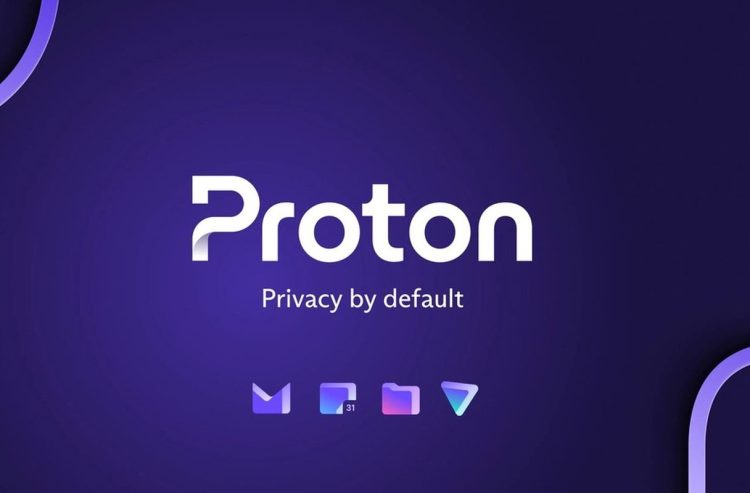
One of the major drawbacks of Proton, however, is its pricing. Its yearly 200GB plan which doesn’t include a subscription to the Proton Ecosystem will set you back $48 a month and the 500GB plan with access to the ecosystem costs $120. These prices are a far cry compared to Google’s pricing of $25 for Google One’s 200GB and $15 for 100GB, both of which include access to Google’s suite. Even so, if you’re someone who puts privacy on top of everything, Proton might be a good option for you. It comes with apps such as Proton Mail, Proton VPN, Proton Calendar, and Proton Pass.
| PROS | CONS |
|---|---|
| The best data privacy in the town | The free version is limited to 1GB |
| Great UI and ease of use | Expensive |
| File History and Easy Data Recovery |
Pricing: $48 per annum for 200GB, $119 per annum for 500GB
Supported Platforms: Android, iOS, Windows, Mac, and Linux
Check out: Proton Drive
3. pCloud
pCloud has long been a trusted cloud storage service, so there is no question of missing out on this one. Aside from offering 3GB of free cloud storage, pCloud provides you the desired flexibility to store and manage your files. It comes with both mobile and desktop apps.
Notably, pCloud allows you to share files and folders with non-users. That means even if someone is not using pCloud, they can view your shared files. It also lets you download folders as a ZIP archive which can come in super handy for keeping the space tidy and making file sharing convenient. Moreover, it even allows you to create upload links for folders so that anyone can send files to your account.
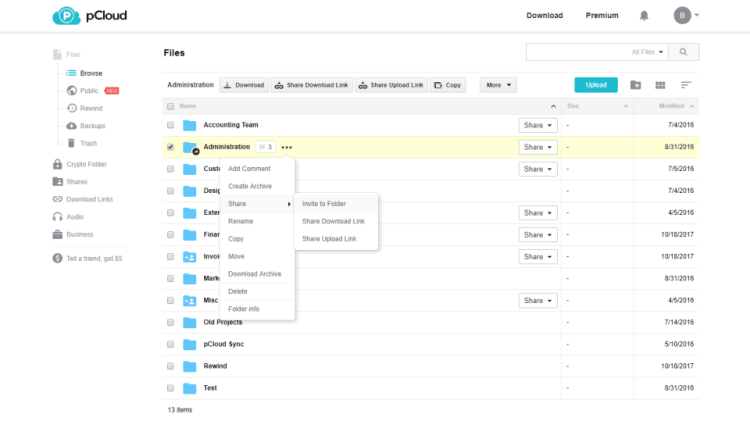
There is no file size limitation, which is yet another plus. And when you add the multimedia streaming option, pCloud leaves very little room for complaint. What’s more, pCloud has a new Backup feature that lets you easily back your files and folders up and even maintains a handy version history so you can easily restore files and more.
PROS CONS 3GB of free cloud storage UI isn’t as intuitive One-time payment for lifetime access No file size limitation Allows multimedia streaming Neat file management
Pricing: 3GB free cloud storage, 500GB is available for a $200 one-time payment. The annual plan will set you back $50 for the same amount of storage.
Supported Platforms: iOS, Android, macOS, Linux, and Windows
Check out: pCloud
4. Dropbox
Widely considered to be the best cloud storage service across platforms, Dropbox is what you should pick to store and manage files with the desired flexibility. While it offers a meager 2GB of free cloud storage, you can earn up to 18GB of free storage by referring it to your friends.
Dropbox offers feature-rich mobile and desktop apps to let you view, upload, and manage files in accordance with your preferences. Probably the best part about it is the ability to edit Microsoft Office files right from inside your browser using Microsoft Office Online. Moreover, it also features highly efficient conversions which can play a vital role in helping you manage your files.

On top of all, Dropbox works with a wide range of apps and services including Zoom, Slack, Adobe Creative Cloud, Asana, and more. Hence, you can use it to work in sync with your colleagues. Talking about security, it’s up to the mark thanks to a trusted track record.
PROS CONS 18GB of free storage Initially, offers just 2 GB of free cloud storage Works with a wide range of apps Can edit documents from inside your browser Great for collaboration and security
Pricing: 2 GB of free cloud storage (free storage can be increased up to 18 GB), premium plan starts from $9.99/month
Supported Platforms: iOS, Android, macOS, Linux, and Windows
Check out: Dropbox
5. MEGA
What makes MEGA worth serious consideration is up to 20 GB of free cloud storage. Add to that the secure end-to-end encryption to keep your data safeguarded and it seems to have covered all the bases to be your preferred choice.
Apart from keeping your files secure, MEGA also comes with an integrated chat to let you exchange messages and share files with enhanced safety. You can use a browser to view and manage your files. With a simple interface and useful file management tools, it lets you keep everything organized in accordance with your preferences.
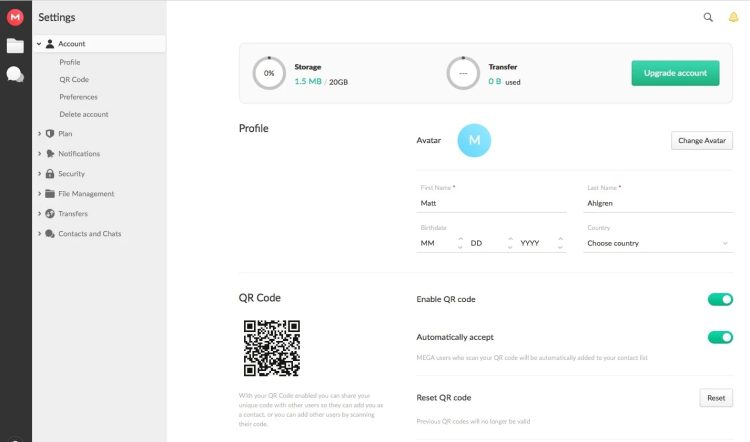
Being available across platforms including Windows, macOS, Linx, iOS, Android, and MEGA ensures your files remain secure and easily available across devices thanks to reliable syncing.
PROS CONS 20GB free cloud storage May decrease storage capacity if you fail to complete tasks Clean and intuitive UI Downloading files is slow Straightforward sharing options Desktop and mobile apps
Pricing: Up to 20 GB free cloud storage, Premium version starts from $6/month
Supported Platforms: iOS, Android, macOS, Linux, and Windows
Check out: MEGA
6. MediaFire
If you are on the lookout for a service that can help you get a ton of free cloud storage along with neat file management tools, MediaFire is the one you should check out. Though it offers just 10 GB of free storage upfront, you can increase it up to 50 GB or more through application downloads and friend referrals.

MediaFire offers a well-optimized mobile app for iPhone and Android, which you can use to manage and keep track of your files on the move. You can use the mobile app to easily upload files, share them with anyone, and collaborate at your own pace.
PROS CONS 10GB free cloud storage Your account expires after inactivity Well-optimized app Easy file-sharing No bandwidth limitations
Pricing: Up to 50 GB free cloud storage, $3.75/month for the premium version
Supported Platforms: Web, Android, iOS
Check out: MediaFire
7. OneDrive
If you are in quest of a cloud service that works seamlessly with Microsoft Office Online, I would recommend you try out OneDrive (formerly SkyDrive). When you sign up for OneDrive, you get 5GB of free space. You can add plenty of extra space through things like mobile photo syncing and friend referrals.
With the desktop app, you can easily transfer files and folders of any type. It allows sharing of both files and folders with non-registered users. And you also get the option to grant full editing privileges or viewing-only permissions based on your needs. You can choose to share password-protected or expiring sharing links.
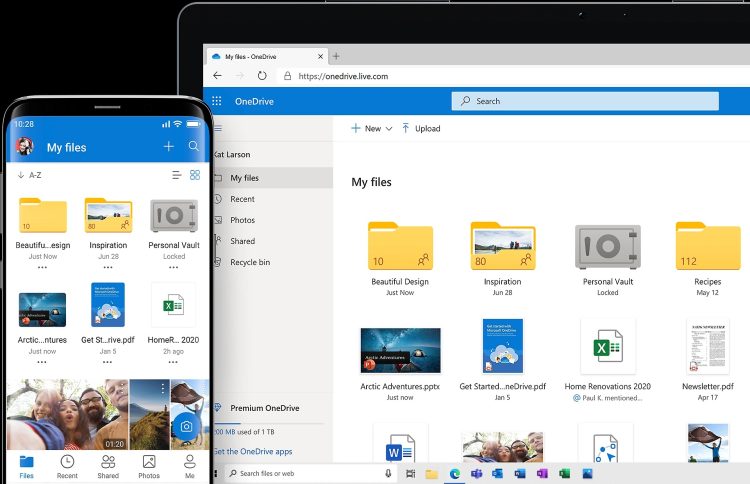
Using OneDrive’s mobile app, you can upload files (both videos and photos) and keep track of the changes with ease. Not to mention, the mobile app also lets you mark up and sign docs. If you can live within the 5 GB cloud space, OneDrive won’t disappoint you.
PROS CONS Works with Office just like Drive works with Google Suite Comparatively less cloud storage Cross-platform and multiple upload ways Straightforward sharing options Mark up documents in the app itself
Pricing: Up to 5 GB of free cloud storage, premium plan starts from $20/year
Supported Platforms: iOS, Android, and Windows
Check out: OneDrive
8. Box
For a more simplified cloud storage and collaboration experience, you can’t go wrong with Box. With 10 GB of free cloud storage, Box ensures you have enough space to accommodate important files and photos. Featuring advanced security controls and intelligent threat detection, it has all the tools to offer the much-needed shield to your files.
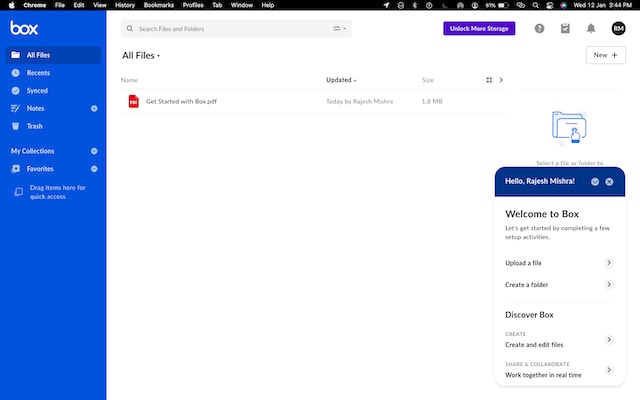
Integrated with several productivity-centric services including Google, Zoom, and more, Box allows you to open, edit, and save files right from one spot. Yeah, you won’t need to hop from one platform to the other to manage your files. Another feature that makes it a preferred choice for professionals and businesses is the seamless e-signatures. You can sign business documents like offer letters and sales contracts with ease.
PROS CONS 10GB free cloud storage Lacks password option for shared files Bulk file downloads and seamless collaboration Limits upload file size Integration with third-party apps Top-notch protection
Pricing: 10 GB of free cloud storage, premium plan starts from $15/month
Supported Platforms: iOS, Android, macOS, and Windows
Check out: Box
9. Sync
Sync is designed to offer a simplified cloud storage experience. With it, you get 5 GB of free cloud space when you sign up. In terms of managing files, Sync is highly flexible. Depending on your needs, you can create shared folders and allow other users to interact with them. It allows you to share files with anyone, irrespective of whether or not they are a Sync user.
With password-protected shares, Sync prevents unauthorized access. You can create centralized folders that both internal team members and external collaborators can easily access. It lets you keep track of all the members who have access to the centralized folders and manage permissions.

To keep some of your personal files under wraps, you can create Vaults and store sensitive files inside. What I love the most about Sync is the ability to upload several files at once through both mobile/desktop apps and website interfaces. Not to mention, it backs up your docs in real-time and offers a straightforward way to restore your data. In a nutshell, it’s a fully-equipped cloud storage service that you would like to have at your disposal.
| PROS | CONS |
|---|---|
| Free storage and password-protected sharing | Lacks option to web uploads |
| Clean and intuitive UI | Not perfect for large files |
| Effortless collaboration options | |
| Complete tasks to increase free space |
Pricing: Up to 5 GB of free cloud storage, premium plan starts from $8/month
Supported Platforms: iOS, Android, macOS, and Windows
Check out: Sync
10. iCloud
For the folks who are locked into the Apple ecosystem, iCloud has always been a top-notch option. The best part about it is the seamless integration with iDevices including iPhone, iPad, and Mac. Hence, it’s able to back up and sync your data more smoothly.
While the mere 5 GB of cloud storage is a big letdown especially if you are looking for plenty of free space, it’s considered to be more secure and privacy-centric. So, if a top-tier safeguard against hacking is on your priority list, this one can fit into your bill. Upgrading to the iCloud+ version can let you unlock some notable features including Hide My Email and Private Relay.
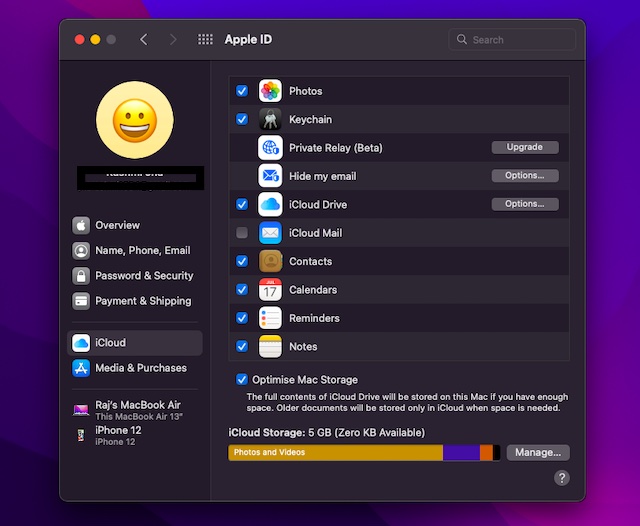
Interestingly, Apple also offers temporary free iCloud storage (iOS 15 or later) to let you back up your data and restore it later. In times when you may want to erase and restore your device from a backup, it will come in super handy.
PROS CONS Affordable and covers all Apple devices Mere 5 GB of free storage Closely tied to the Apple exosystem Seamless integration Highly secure
Pricing: 5 GB of free storage, Premium version starts from $0.99/month
Supported Platforms: iOS, macOS, and Windows
Check out: iCloud
11. Jumpshare
Jumpshare has got all the bases covered to be your preferred free cloud storage service. When you create a Jumpshare account, you get 2 GB of free space. And you can increase the total storage up to 18 GB by referring friends to join.
Jumpshare features a modern-looking interface that feels snappier. The highlight of this service is the built-in screen recorder that allows you to record your screen as a video or GIF. You can use the recording with webcam, drawing, and audio to enhance your presentation. Plus, it also provides handy annotation and markup tools to help you share your heads with better control.
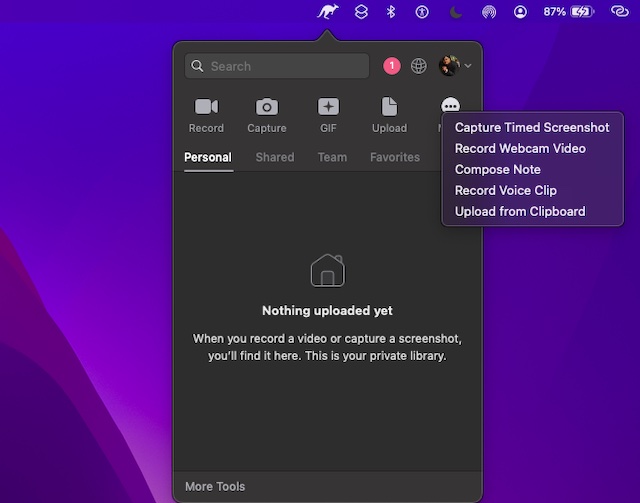
Though the 250 MB upload limit per file is a disappointment, Jumpshare more than just covers the ground by offering a host of proficient file management tools.
PROS CONS High upload file size limit Initially offers just 2 GB of free storage Clean and intuitive UI Premium subscription is pretty expensive Annotation and Markup tools Faster uploading from desktop
Pricing: 2 GB of free storage (can be increased up to 18 GB), Premium version starts from $10/month
Supported Platforms: iOS, macOS, and Windows
Check out: Jumpshare
12. Icedrive
There is a lot to like about Icedrive. For starters, it provides a reasonable 10 GB of free cloud storage. Plus, it allows you to stream your music and videos right from your account without needing to re-download your files. This smooth play is also available for people you share your files with. Yes, you read that right! It doesn’t force people to create an account to be able to download and stream files you share.
You can favorite specific files quickly from the Favorites tab and control bandwidth in the desktop program to suit your needs better. Moreover, Icedrive also lets you share files via email addresses or public links and download old versions of files.

Other notable features include WebDAV, encryption, and password-protected share links which you can unlock by upgrading to the premium version. Better still, Icedrive is available across platforms to let you store and manage your files without having to deal with the incompatibility issue.
PROS CONS Password-protected sharing Bandwidth is limited to 3 GB/day Stream media right from the drive storage Encryption and advanced link sharing are paid Ability to store older versions of files Allows you to preview PDFs
Pricing: 10 GB of free storage, Premium version starts from $1.67/month
Supported Platforms: iOS, Android, macOS, Windows, and Linux
Check out: Icedrive



















For Linux users Dropbox and pCloud could be the best. Using both on MX Linux. pCloud has a linux client app which integrates very well with the file manager, it feels same as managing local file within the default file manager with drag & drop feature. Dropbox has a linux client but doesn’t integrate as well with the file manager. Google Drive is very good on Windows, Android and iOS , but lack of a linux client makes syncing data a hassle on linux, though workaround is possible with Rclone.
thank you so much for sharing this information
You just missed Tera box 1Tb storage
Useful information about cloud storage
Already using MEGA, will try others too, thanks
you forgot terabox which gives 1tb cloud storage
It is a China based leaking and worst. Only storage 1 tb rest all are disgusting. Chances are they can leak all ur data and give it to the China government.